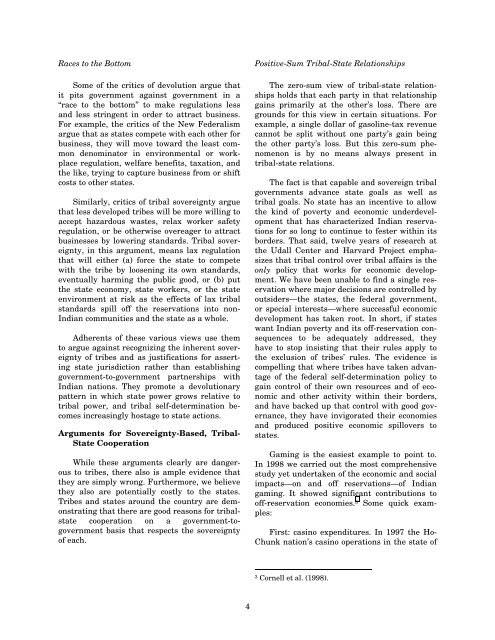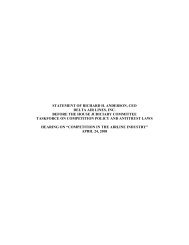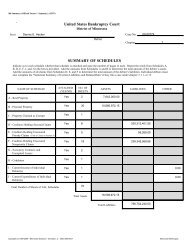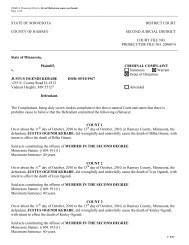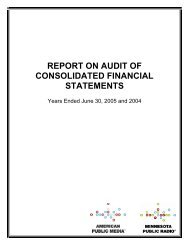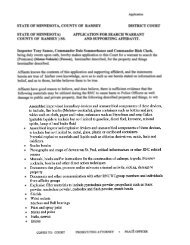Stephen Cornell and Jonathan Taylor - American Public Media
Stephen Cornell and Jonathan Taylor - American Public Media
Stephen Cornell and Jonathan Taylor - American Public Media
You also want an ePaper? Increase the reach of your titles
YUMPU automatically turns print PDFs into web optimized ePapers that Google loves.
Races to the Bottom<br />
Some of the critics of devolution argue that<br />
it pits government against government in a<br />
“race to the bottom” to make regulations less<br />
<strong>and</strong> less stringent in order to attract business.<br />
For example, the critics of the New Federalism<br />
argue that as states compete with each other for<br />
business, they will move toward the least common<br />
denominator in environmental or workplace<br />
regulation, welfare benefits, taxation, <strong>and</strong><br />
the like, trying to capture business from or shift<br />
costs to other states.<br />
Similarly, critics of tribal sovereignty argue<br />
that less developed tribes will be more willing to<br />
accept hazardous wastes, relax worker safety<br />
regulation, or be otherwise overeager to attract<br />
businesses by lowering st<strong>and</strong>ards. Tribal sovereignty,<br />
in this argument, means lax regulation<br />
that will either (a) force the state to compete<br />
with the tribe by loosening its own st<strong>and</strong>ards,<br />
eventually harming the public good, or (b) put<br />
the state economy, state workers, or the state<br />
environment at risk as the effects of lax tribal<br />
st<strong>and</strong>ards spill off the reservations into non-<br />
Indian communities <strong>and</strong> the state as a whole.<br />
Adherents of these various views use them<br />
to argue against recognizing the inherent sovereignty<br />
of tribes <strong>and</strong> as justifications for asserting<br />
state jurisdiction rather than establishing<br />
government-to-government partnerships with<br />
Indian nations. They promote a devolutionary<br />
pattern in which state power grows relative to<br />
tribal power, <strong>and</strong> tribal self-determination becomes<br />
increasingly hostage to state actions.<br />
Arguments for Sovereignty-Based, Tribal-<br />
State Cooperation<br />
While these arguments clearly are dangerous<br />
to tribes, there also is ample evidence that<br />
they are simply wrong. Furthermore, we believe<br />
they also are potentially costly to the states.<br />
Tribes <strong>and</strong> states around the country are demonstrating<br />
that there are good reasons for tribalstate<br />
cooperation on a government-togovernment<br />
basis that respects the sovereignty<br />
of each.<br />
4<br />
Positive-Sum Tribal-State Relationships<br />
The zero-sum view of tribal-state relationships<br />
holds that each party in that relationship<br />
gains primarily at the other’s loss. There are<br />
grounds for this view in certain situations. For<br />
example, a single dollar of gasoline-tax revenue<br />
cannot be split without one party’s gain being<br />
the other party’s loss. But this zero-sum phenomenon<br />
is by no means always present in<br />
tribal-state relations.<br />
The fact is that capable <strong>and</strong> sovereign tribal<br />
governments advance state goals as well as<br />
tribal goals. No state has an incentive to allow<br />
the kind of poverty <strong>and</strong> economic underdevelopment<br />
that has characterized Indian reservations<br />
for so long to continue to fester within its<br />
borders. That said, twelve years of research at<br />
the Udall Center <strong>and</strong> Harvard Project emphasizes<br />
that tribal control over tribal affairs is the<br />
only policy that works for economic development.<br />
We have been unable to find a single reservation<br />
where major decisions are controlled by<br />
outsiders—the states, the federal government,<br />
or special interests—where successful economic<br />
development has taken root. In short, if states<br />
want Indian poverty <strong>and</strong> its off-reservation consequences<br />
to be adequately addressed, they<br />
have to stop insisting that their rules apply to<br />
the exclusion of tribes’ rules. The evidence is<br />
compelling that where tribes have taken advantage<br />
of the federal self-determination policy to<br />
gain control of their own resources <strong>and</strong> of economic<br />
<strong>and</strong> other activity within their borders,<br />
<strong>and</strong> have backed up that control with good governance,<br />
they have invigorated their economies<br />
<strong>and</strong> produced positive economic spillovers to<br />
states.<br />
Gaming is the easiest example to point to.<br />
In 1998 we carried out the most comprehensive<br />
study yet undertaken of the economic <strong>and</strong> social<br />
impacts—on <strong>and</strong> off reservations—of Indian<br />
gaming. It showed significant contributions to<br />
off-reservation economies. 3 Some quick examples:<br />
First: casino expenditures. In 1997 the Ho-<br />
Chunk nation’s casino operations in the state of<br />
3 <strong>Cornell</strong> et al. (1998).


